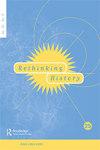我们讲述的历史:智利公立高中的历史意识和学生抗议
IF 0.8
2区 历史学
Q1 HISTORY
引用次数: 0
摘要
摘要在过去的十五年里,高中生作为反新自由主义和女权主义社会运动的成员,成为智利政治版图中的关键人物。尽管社会研究人员越来越关注他们,但很少有人分析这些年轻人在政治斗争中如何与历史联系并利用历史。本文结合民族志和微观历史的方法,考察了一所智利公立高中及其特定而广泛的历史叙事,在大规模学生抗议的背景下传播和争论——以及过去的合作和冲突的教学手段和实践——不仅让这所学校的学生利用历史来支持他们的政治议程,而是参与一个政治领域的持续生产,在这个政治领域中,他们的历史社区的边界以及谁可以被视为其中的一员都存在争议。在这样做的过程中,文章阐明了现代社会中历史意识、政治行动和公民身份之间的一些复杂互动,并说明了将历史和人种学视角相结合,以可视化人类利用历史时存在的细微差别和紧张关系的有用性。此外,它揭示了历史意识本身的概念,说明了历史学家和其他社会研究人员如何将其付诸实践,以更好地理解人类如何与过去以及现在和未来联系在一起。本文章由计算机程序翻译,如有差异,请以英文原文为准。
The histories we tell: historical consciousness and student protests in a Chilean public high school
ABSTRACT In the last fifteen years, high schoolers became key actors in the Chilean political landscape, as members of anti-neoliberal and feminist social movements. Although social researchers have paid increasing attention to them, few have analyzed how these young people relate to and make use of history in the context of their political struggles. Combining an ethnographic and a microhistorical approach, this article examines a Chilean public high school and a particular and widespread historical narrative about it. I argue that the different ways in which this narrative was invoked, transmitted and contested in a context of massive student protests – and the pedagogical devices and practices of cooperation and conflict used to do so – allowed the students of this school not only to use history in favor of their political agendas, but to participate in the continual production of a political field in which the borders of their historical community and who could be considered members of it were being disputed. In doing this, the article illuminates some of the complicated interactions between historical consciousness, political action and citizenship in modern societies, as well as illustrates the usefulness of combining an historical and an ethnographic lens to visualize the nuances and tensions existing when human beings make use of history. Further, it sheds light on the concept of historical consciousness itself, illustrating how historians and other social researchers can operationalize it to better comprehend how human beings relate with the past, but also the present and the future.
求助全文
通过发布文献求助,成功后即可免费获取论文全文。
去求助
来源期刊

Rethinking History
Multiple-
CiteScore
1.20
自引率
0.00%
发文量
26
期刊介绍:
This acclaimed journal allows historians in a broad range of specialities to experiment with new ways of presenting and interpreting history. Rethinking History challenges the accepted ways of doing history and rethinks the traditional paradigms, providing a unique forum in which practitioners and theorists can debate and expand the boundaries of the discipline.
 求助内容:
求助内容: 应助结果提醒方式:
应助结果提醒方式:


